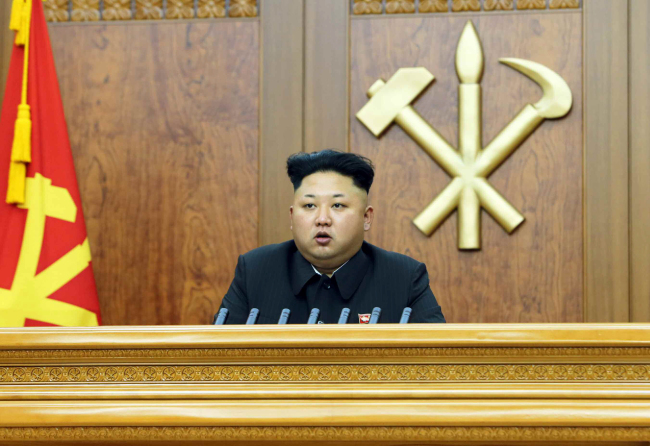North Korean leader Kim Jong-un said Thursday he was open to a summit with South Korea and willing to mend cross-border ties as his country strives to head off international pressure over its military ambition and human rights record.
In his nationally televised New Year address, he said high-level talks could be restarted including at the top level “if Seoul truly seeks to improve relations through dialogue.”
“If the atmosphere and environment are ready, there is no reason not to hold highest-level talks,” Kim said.
In his nationally televised New Year address, he said high-level talks could be restarted including at the top level “if Seoul truly seeks to improve relations through dialogue.”
“If the atmosphere and environment are ready, there is no reason not to hold highest-level talks,” Kim said.

He called for efforts to make “substantive progress in dialogue and negotiations” and “open a grand path for an independent reunification this year.”
Seoul welcomed the message, which came just days after Unification Minister Ryoo Kihl-jae proposed holding a high-level meeting this month.
“The government reckons that dialogue and cooperation should continue between the two Koreas for the development of their relationship and the peaceful unification of the peninsula,” the Unification Ministry said in a statement.
“If North Korea is indeed willing to improve relations through dialogue, it should accept our proposal for talks.”
The 30-minute speech was the young ruler’s third New Year address since he took power following the death of his father, longtime strongman Kim Jong-il, three years ago.
Kim’s remarks gained much traction especially as Russia has invited the leaders of both Koreas to attend a ceremony in May marking the 70th anniversary of the end of World War II. With the regime looking to break international isolation and its ties with China remaining frosty, Kim may resort to Russian President Vladimir Putin for his first summit and overseas outing, some observers say.
In a presidential unification panel meeting in October, President Park Geun-hye said she was open to dialogue with the North while dealing sternly with its provocations. Entering the third year of her presidency, Park also pledged last week to step up efforts to help lay the foundation for a unification this year.
Last year, she sought reconciliation with the recalcitrant neighbor and unveiled a series of unification-related initiatives as the centerpiece of her second-year leadership. But it triggered a backlash from Pyongyang, which deemed the efforts as an attempt to precipitate its downfall, while failing to build on rare momentums such as the surprise trip in October to the South by three top North Korean officials chiefly aimed at attending the closing ceremony of the Asian Games in Incheon.
“Compared with last year’s message, the latest one gives greater weight to the improvement of cross-border relations and more details despite containing preconditions,” a Seoul official said, asking for anonymity due to the sensitivity of the matter.
But the address also indicated the North’s resolve to strengthen military power in the face of ever-growing international pressure over not only its nuclear program but also its dire human rights record and more recently its alleged cyberattack on Sony Pictures over “The Interview,” a comedy film about a plot to assassinate Kim. His past two New Year speeches focused more on economic growth.
The Korean National Diplomatic Academy affiliated with Seoul’s Foreign Ministry assessed in its 2015 outlook that despite potential “surprise factors” including an inter-Korean summit, Kim could reinforce its “national, institutional tools of violence” to tighten his grip. A small exchange of fire across the border, such as over a launch of anti-North leaflets by South Korean activists, could escalate into a bigger military clash, it noted.
Its “military-first” policy and parallel pursuit of nuclear and economic development would remain in place “as long as the enemies continue plotting to crush its socialist system,” the North Korean leader said.
“This year’s speech reflects North Korea’s sense of crisis both internally and externally,” the state-run Korea Institute for National Unification said in its analysis.
“This shows that the regime seriously thinks about and is responding to the issues of human rights and the movie.”
Another top official has warned against an early assessment, citing past “positive” New Year speeches followed by escalated tension and even military provocations.
“In terms of inter-Korean relations, you need to look at both the words and actions,” he told reporters on customary condition of anonymity.
“North Korea faces a triple whammy ― diplomatic isolation, economic hardships and the human rights problem. In the past, the nuclear issue was the focal point but it now has to respond to other issues. … It has nothing to gain at a time when it is suffering from such a triple whammy.”
By Shin Hyon-hee (heeshin@heraldcorp.com)








![[KH Explains] Hyundai's full hybrid edge to pay off amid slow transition to pure EVs](http://res.heraldm.com/phpwas/restmb_idxmake.php?idx=644&simg=/content/image/2024/04/18/20240418050645_0.jpg&u=20240419100350)






![[From the Scene] Monks, Buddhists hail return of remains of Buddhas](http://res.heraldm.com/phpwas/restmb_idxmake.php?idx=652&simg=/content/image/2024/04/19/20240419050617_0.jpg&u=20240419175937)

![[KH Explains] Hyundai's full hybrid edge to pay off amid slow transition to pure EVs](http://res.heraldm.com/phpwas/restmb_idxmake.php?idx=652&simg=/content/image/2024/04/18/20240418050645_0.jpg&u=20240419100350)

![[Today’s K-pop] Illit drops debut single remix](http://res.heraldm.com/phpwas/restmb_idxmake.php?idx=642&simg=/content/image/2024/04/19/20240419050612_0.jpg&u=)